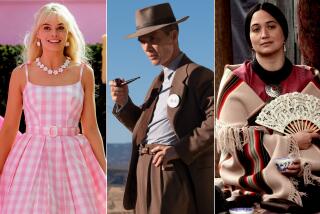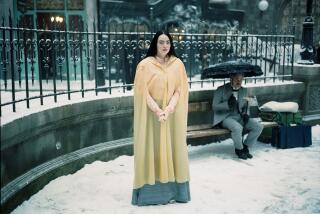MOVIE REVIEW : ‘Beautiful Dreamers’ Transcends Its Triteness
- Share via
“Beautiful Dreamers” (at the Beverly Center) focuses on the friendship of a Canadian doctor, Maurice Bucke (Colm Feore), and the great American poet Walt Whitman (Rip Torn). In style it is strictly conventional and very earnest, as Canadian films tend to be, but Bucke, Whitman and Bucke’s proper Victorian wife, Jessie (Wendel Meldrum), are so beautifully written and acted that the film is quite appealing and illuminating anyway.
In a sense the film’s traditional form sets off its portrait of a group of progressive individuals prepared to defy the rigid social mores of their time and place; it’s fortunate that what “Beautiful Dreamers” has to say outweighs the trite way in which it says it.
It is 1880, and Whitman, who has a retarded brother, is impressed with Bucke’s speech in Philadelphia declaring that in regarding the mentally ill, “feelings must proceed thinking.” Whitman finds himself accompanying Bucke back to the small town of London, Ontario, where the young physician has just been appointed medical superintendent of its insane asylum.
Whitman is there to lend Bucke moral support, but his impact goes far beyond his suggestion that sports might be a good idea for the asylum’s male inmates and music for its female inmates. Already open-minded and intuitive, Bucke is liberated even further by Whitman’s life-embracing, free-thinking philosophy. His wife, initially horrified by her loud and uninhibited house guest, gradually finds herself responding to his poetry as well as his presence. Inevitably, Bucke’s ground-breaking policies at the asylum and Whitman’s earthiness in local society are going to clash with Victorian sensibilities.
It’s too bad that writer-director John Kent Harrison, in his feature directorial debut, doesn’t tell his story on the sophisticated, detached level of “The Elephant Man,” going for sentiment rather than the merely sentimental, a quality underlined by the film’s “stirring” score. Nevertheless, Feore brings an appealing freshness and idealism to Bucke, who was to become Whitman’s biographer, that represents the Victorian scientific spirit at its humane best, and it’s fun to watch Torn fill with such ease and roguish humor his larger-than-life role as Whitman.
Meldrum in truth has the most challenging part, as a Victorian wife unshackling herself from prudery and propriety, and she suggests Jessie Bucke’s transformation with subtlety and conviction. The issue of Whitman’s purported homosexual tendencies is not dealt with beyond Jessie’s perception of his essential loneliness and her husband’s declaration to Whitman that in writing about him he assures him he’s not interested in why he never married. While this is disappointing we have to remember that, after all, we’re not in 1980 but 1880, the year Whitman turned 61. By and large “Beautiful Dreamers” (rated PG-13 for nudity, adult themes) is a good-looking and meticulous period piece that reminds us of how rarely the major figures in American literature--or history, for that matter--are depicted on the screen.
‘Beautiful Dreamers’
Colm Feore: Dr. Maurice Bucke
Rip Torn: Walt Whitman
Wendel Meldrum: Jessie Bucke
Sheila McCarthy: Mollie Jessop
A Hemdale Pictures presentation. Writer-director John Kent Harrison. Producers Michael Maclear, Martin Walters. Executive producer Stephen J. Roth. Cinematographer Francois Protat. Editor Ron Wisman. Costumes Ruth Secord. Music Lawrence Shragge. Production design Seamus Flannery. Sound John Megill, Jack Buchanan. Running time: 1 hour, 47 minutes.
MPAA-rated PG-13 (for nudity, adult themes).
More to Read
Only good movies
Get the Indie Focus newsletter, Mark Olsen's weekly guide to the world of cinema.
You may occasionally receive promotional content from the Los Angeles Times.










